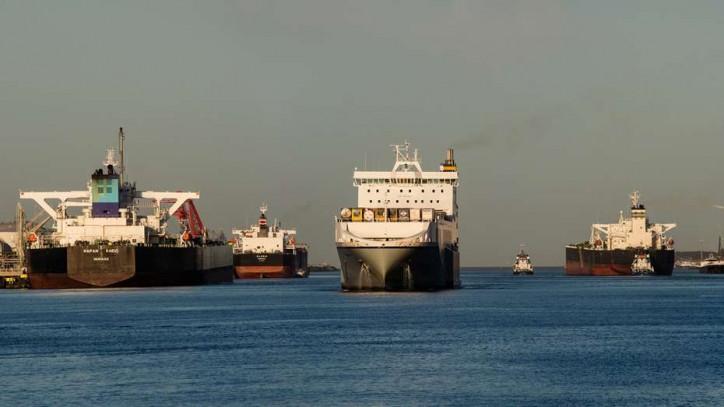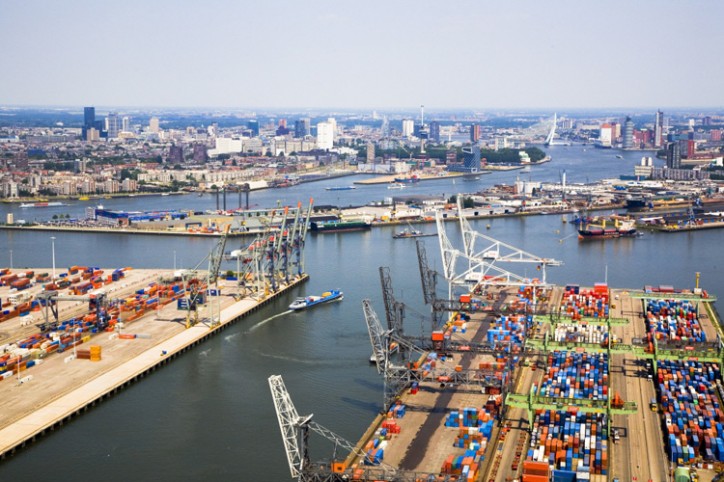Goods throughput in the port of Rotterdam increased by a total 4.9% to 466.4 million tonnes in 2015. This significant growth is almost entirely attributable to the increased throughput of crude oil and oil products. Allard Castelein, CEO Port of Rotterdam Authority:
"Low oil prices result in high margins for the refineries, so they have large quantities of oil shipped in for refining. This not only applies to the refineries in Europe but also to those in Russia. The latter produce a relatively large amount of fuel oil which is shipped to the Far East via Rotterdam. The result is an 8% increase in the throughput of crude oil and an 18% increase in the throughput of oil products"

Although this year the port owes its growth to oil, according to Castelein the port is in a transition phase:
"Due to the need to combat climate change, the port is fully committed to energy efficiency as well as the development of renewable energy and bio-based chemistry. Rotterdam already has one of the most energy efficient refining and chemicals clusters and the largest bio-based cluster in the world. It is our ambition to retain our leading position.” When it comes to throughput in 2016, the Port Authority aims to match the port’s strong performance in 2015.
Liquid bulk
The throughput of crude oil increased by 8.1% to 103.1 million tonnes, driven by low oil prices. The supply and transport of oil products increased by 18.0% to 88.5 million tonnes. In addition to a substantial increase in the throughput of fuel oil, more gas oil and diesel came into the port for the European market. The throughput of LNG increased by no less than 91.3%. However, in absolute terms with 2.3 million tonnes, this segment is still small. LNG prices in the Far East have fallen sharply and are now comparable to those in Europe, which increases the trade and shipping volume of gas in our region. The category other liquid bulk decreased by 0.5% to 30.8 million tonnes. This is the sum of various types of cargo. The throughput of chemical products, for instance, fell, while the throughput of palm oil and biodiesel rose. In total, 10.9% more liquid bulk was handled in Rotterdam. Since the total throughput comprises 48% liquid bulk, this segment largely determines the overall throughput figures.

Dry bulk
The throughput of ores and scrap fell by 0.6% to 33.9 million tonnes. Although steel demand slightly increased, this was offset by the import of cheap Chinese steel. The throughput of coal increased by 1.0% to 30.7 million tonnes. The coal transported to Rotterdam consists for approximately 40% of coking coal used in blast furnaces and 60% of coal for power plants. The vast majority thereof is used in Germany. The demand for energy coal in Germany decreased due to the increase in solar and wind energy. In the Netherlands, demand rose due to the commissioning of two new power plants on the Maasvlakte. Additionally, the concentration of coking coal entering Rotterdam slightly increased the throughput volume. Good harvests provided lower imports of mostly oil seeds and fodder, as a result of which agricultural bulk fell by 3.8% to 10.8 million tonnes. The amount of other dry bulk decreased by 3.9% to 12.3 million tonnes as fewer nutrients and minerals were imported. In contrast, more fly ash, a residue of coal plants, was transported to the United States. All in all, the handling of dry bulk decreased by 1.0%.
Containers
The handling of containers fell by 0.5% to 12.2 million TEU (twenty feet equivalent unit, the unit of measurement for containers) and by 1.1% to 126.3 million tonnes ( weight). In the first half of the year 6.2 million TEU was handled, the second half 6.0 million TEU. The volume of transport to Asia, by far the most comprehensive trade flow throughout 2015, increased by 2%. Container transport to Latin and North America fell. Within Europe, transport to the Iberian Peninsula and Great Britain increased. The strong British economy also played an important role in attracting roll on roll off (Ro/Ro) traffic over the North Sea. An additional factor was that transportation via Calais suffered from strikes, refugee problems and failures in the tunnel under the English Channel. Ro/Ro traffic increased by 10.1% to 22.0 million tonnes. Other break bulk decreased by 5.5% to 5.7 million tonnes. The main reason was the one-time flow of incoming container cranes in 2014. Together, Ro/Ro and other break bulk make up the category break bulk. This category increased by 6.5%.
Source: www.portofrotterdam.com